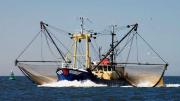Pollution of marine ecosystems threatens human health, but a graver concern is the collapse of global fisheries due to overharvesting. A growing global population is consuming more fish, a generally healthy and important source of nutrition, but the United Nations Food and Agriculture Organization estimates that nearly 90 percent of global stocks are being fully fished or overfished, a situation that could lead to serious future declines in availability. (A species is considered overfished when it is harvested past the point that it can sustain itself through reproduction, as has happened with Atlantic cod.) That could have a devastating impact in particular on subsistence fishermen and the communities they feed, says Christopher Golden, a research scientist at the Harvard T.H. Chan School of Public Health.
With funding from the Wellcome Trust, Golden and his colleagues are studying how these declines, combined with climate change, will affect human nutrition and food security; they are investigating the problem of unsustainable fishing as well as the impacts of sea temperature rise, ocean acidification, and coral bleaching. All those issues will influence the distribution and abundance of fish around the world, Golden says, leading to “particular geographical hot spots in terms of impacts on human well-being, human livelihoods, and human health.” Although such climate-change effects loom in the future, Golden considers overharvesting the biggest problem right now. People are simply taking more than the sea can provide.
His team’s first broad study—published in Nature in 2016—estimated that more than 10 percent of the world’s population will be at risk of a deficiency in key nutrients if fish stocks continue to decline in the coming decades. He and his colleagues are conducting more detailed case studies of affected communities in Belize, the Solomon Islands, Madagascar, British Columbia, and other locations, to understand the local dynamics of seafood harvesting, markets, and nutrition.
For many less-affluent populations around the world, especially in developing countries, seafood is the primary animal-source food available—and therefore “critically important for nutritional delivery,” Golden explains. These groups not only lack access to nutritious foods and dietary supplements, but also often face a higher risk of infections and parasites that can deplete nutrients from the body. Research on the nutritional importance of animal-source foods often focuses on protein, he says, but his work suggests that nutrients like vitamin A, vitamin B12, iron, zinc, and certain fatty acids are even more critical.
Aquaculture—the farming of fish and other seafood—now outpaces wild catch and is often seen as a solution to overfishing. But Golden’s research finds that aquaculture policies and markets frequently fall short. Under current systems, relatively few aquaculture products actually benefit the nutritionally vulnerable; instead, they’re often high-value species that are exported to other countries or sent to wealthier urban households. It’s therefore incredibly important, he says, “that we focus on revising policies and management structures for wild-fish catch, reorient aquaculture development and aquaculture markets to be nutrition-sensitive, and really understand who is accessing this as a food.”










